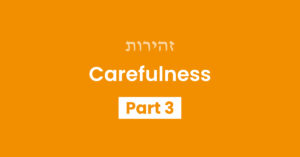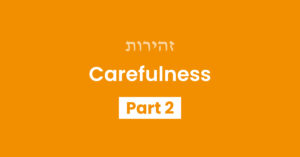Today is the 8th and last day of Chanukah. We have just entered the month of Teves, one of the darkest months of the year. During these winter months, sunset is relatively early, and the nights are long. The Chanukah lights are giving off their last glow, and we are soon going to be plunged into darkness.
Aside from the physical darkness we experience during Teves, there’s another type of darkness that we experience at many points throughout the year.
What is this darkness? It’s the darkness of Hergel (habit).
Over the next few weeks, we will try to understand the nature of this darkness, and how we can use the middah of Zehirus to bring light into this darkness.
The Darkness of Habit and Following Your Nature
Imagine that your friend is getting married soon, and she asks you to help put labels and stamps on envelopes for her wedding invitations. You readily agree, so she sets you up in a room with the envelopes. “Here you go,” she says. “But if you don’t mind,I’m going to turn off the lights while you work. My parents want to save money on the electricity bill.”
“What?! Are you serious?!” you respond. “How on earth am I supposed to put labels and stamps on envelopes in the dark, if I can’t see what I’m doing?! I’ll probably end up putting half of the labels upside-down!”
When we’re in a place of darkness, we can’t see what we’re doing. It’s unreasonable to expect someone to accomplish a task that requires sight if he’s forced to work in the dark.
This darkness can come from an external source (your friend shutting off the light) or it can be self-imposed. Just as it would be ridiculous for your friend to shut off the light while you work, it would be equally irresponsible for you to impose “darkness” on yourself, saying, “Sure, I’ll put stamps and labels on the envelopes, but if you don’t mind, I’m feeling really tired right now so I’m going to do it with my eyes closed.”
Of course we all know that would be ridiculous! If you don’t see or pay attention to what you’re doing, inevitably you’re going to do it wrong!
Although it’s clearly ridiculous to try to accomplish certain tasks with our eyes closed, the truth is that we do this all the time. Whenever we go through life simply following our instincts and habits – not watching what we’re doing – it’s as if our eyes are closed. Whenever we let our actions and choices be determined by whatever habits come most easily and naturally to us, it’s as if we are living in the dark.
Whenever we go through life simply following our instincts and habits – not watching what we’re doing – it’s as if our eyes are closed.
This is actually what animals do. Animals were created with instincts to help them survive, such as the instinct to chase after prey, eat bugs, or fight to defend their young. An animal doesn’t think about what it does. It just blindly follows whatever it feels like doing… whatever its instincts tell it to do. When a cow feels hungry and it sees grass, it eats the grass. When a bee sees a threat, it stings. When a dog sees an intruder, it barks. Animals just follow their natural instincts. They have no control over what they do. Animals are essentially living in darkness.
But human beings are different. Although many of our body parts and instincts are similar to animals – we have eyes to see, teeth to chew, and legs to run – human beings were endowed with an extra power: the power of thought and awareness.1
Human beings were endowed with an extra power: the power of thought and awareness.
Hashem created us with a powerful mind that we’re supposed to use to control and put a pause on our natural instincts and habits.
When we feel like eating, but we stop ourselves and think: “Wait, is this kosher?” When we are about to take a bite, but we pause and think: “Wait, did I make a bracha yet?” When we want to pick up a $20 bill lying on the floor on Shabbos, but we pause and think: “Wait, is this muktzah?” – In all of these cases, we are using our human power of thought and awareness to put a “brake” on what our natural instincts are pushing us to do.
Whenever we use this power of awareness, we are exercising our unique human abilities, and fulfilling the purpose of our creation.
When we use our minds to control our instincts and habits, we are living with awareness. We are living with the lights on.
When we use our minds to control our instincts and habits, we are living with awareness. We are living with the lights on.
Indeed, Rav Dessler2 writes that when we remain passive and allow our behaviors to be determined by our natural habits, without thinking about what we are doing, we are living in darkness. This is one of the yetzer hara’s most powerful techniques – putting the “darkness” of forgetfulness into this world so that we won’t see or be aware of everything we’re doing3
This is also what the Greeks tried to do to the Jewish people. The Midrash writes4 that the Greeks are compared to darkness, because in the times of Chanukah, they tried to make us forget about Torah and mitzvos. Interestingly, The Sfas Emes5 points out that Shikchah (forgetfulness – שכחה) has the same letters as Chasheichah (darkness – חשכה). When we live as forgetful people, not paying attention to what we’re doing, we are living in darkness.
Zehirus: Living in the Light
How do we overcome this darkness, and bring light into the world?
The Mesilas Yesharim6 writes that the answer is Zehirus, which comes from the root zahir, meaning “careful.” Living with Zehirus means that you are aware, careful, and paying attention to everything you do. You keep your eyes open and pay attention to what you’re doing at all times. A person who lives this way is choosing to elevate himself from the level of animals who live in darkness, and choosing instead to live in the light. Zehirus is about living with your eyes open.
Living with Zehirus means that you are aware, careful, and paying attention to everything you do.
For example, perhaps you usually wake up in the morning feeling groggy and half-awake. You stumble over to the sink to wash netilas yadayim. You are about to pour the water over your hands in the haphazard manner you’re used to doing, but you stop yourself and think: “Wait! I am a human being. Even though I naturally feel like washing sloppily and lazily, I can overcome my nature and choose to act differently.” You push yourself to be awake and make sure to pour the water over your entire hands, as the the halachah requires.
By using your human power of thought and awareness to ensure that you fulfill the mitzvah properly, you are now fulfilling the purpose of your creation.
Indeed, Rav Yerucham Levovitz7 writes that Zehirus is really all about overcoming your nature,andZehirus is the foundation for all mitzvos and middos. Just as a person must turn on the lights and open their eyes in order to stuff envelopes properly, we have to train ourselves to pay attention to our actions in order to succeed in our service of Hashem.
This week, let’s try to bring the light of Chanukah into this dark month of Teves by practicing the middah of Zehirus. Every time we stop ourselves from blindly following our habits – and instead, remind ourselves to fulfill mitzvos with a sense of awareness, we are bringing light into this world and actualizing our potential as human beings.
Sources: [1] Rashi on Bereishis 2:7; [2] Michtav Mei’Eliyahu Vol. 4. pg. 133; [3] See Midrash Rabbah on Bereishis 89:1 and Rav Dessler Michtav Mei’Eliyahu Vol. I. pg. 71; [4] Bereishis Rabbah 2:2; [5] Sfas Emes Mikeitz 640; [6] Mesilas Yesharim Chapter 3; [7] Daas Torah: Acharei Mos pg. 156
Your Challenge
Once a day, pay attention while doing a mitzvah, and be careful to do it properly.
FOR EXAMPLE:
- While washing netilas yadayim, pay attention to where the water goes, and make sure the water covers your entire hands. Also make sure to dry your hands completely.
(To learn the laws of Netilas Yadayim, see this shiur or this video) - Say Asher Yatzar slowly, being careful to pronounce every word properly.
- Say “Amen Yeheih Shmeih Rabbah…” slowly and clearly.
- When you are about to eat something but are not sure what the brachah is, go look up the brachah or ask a Rav.
- While saying a brachah on food, take care to pronounce every word clearly.
- When you bow in the middle of Shemoneh Esrei, take care to bow down all the way.
- When you say Hashem’s Name in a brachah, make sure to say it clearly.
Torah Questions
- What reward does Hashem promise for us in Devarim 6:18 if we are careful to fulfill His mitzvos?
- According to Devarim 4:6, when we are careful to keep the mitzvos properly, the other nations will think that we are ______?
- What are mitzvos compared to, in Mishlei 6:23?
- According to Pirkei Avos 2:1, why should we be very careful to fulfill the “minor” mitzvos, just as we are careful to fulfill the more “severe” ones?
- According to Shabbos 23b, one who is careful about the mitzvah of Mezuzah will merit to have ____?
- According to Shabbos 23b, one who is careful about the mitzvah of Tzitzis will merit to have ____?
- According to Brachos 6b, what does Rav Huna say that a person should always be careful about?
- When Rabbi Eliezer got sick and his students came to visit him, Rabbi Eliezer told them: “Be very careful with the __?__ of your friends.” (Brachos 28b)
Questions to Ponder
- Let’s say you want you want to work on Zehirus in a certain area, such as being careful to wash Netilas Yadayim properly. Which factors in your life might get in the way, or what obstacles might you face, that may make it difficult for you to do the mitzvah properly every day?
- The Gemara (Eiruvin 21b) says that a person should be more careful to fulfill Divrei Sofrim (mitzvos d’rabbanan) than mitzvos d’oraisah. How could that be? Shouldn’t mitzvos d’oraisah be MORE important than mitzvos d’rabbanan?
- The Gemara says that Torah leads to Zehirus. What does that means? How do you think Torah leads to Zehirus?





